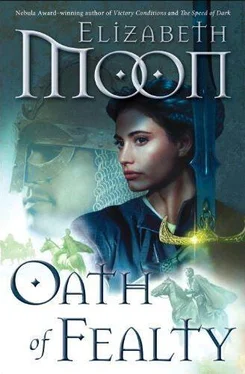They nodded. “I hope that doesn’t happen by mistake,” Dorrin said. “I still don’t know how I did it. And I don’t want to.” She wrapped the crown again, then the other items, and placed them back in the padded sack. They called to her; she bespoke them in her mind, telling them they would be safe.
“You want us to take these things?” Duke Mahieran said.
“I do. I thought perhaps the prince could wear them, that they would recognize someone of true royal blood—I was willing to think our family had stolen them long ago, in Gird’s time—but I see now that might be dangerous to him. Still, if they are in your treasury and you know it, you can be sure they are not in my possession. That I am not plotting to put that crown on my own head—even if it does talk to me.”
The prince nodded, then looked at Duke Mahieran and High Marshal Seklis before turning again to Dorrin. “It is not yet the day of my coronation, and for matters of state I must still consult the Regency Council. But here are two members of that Council. I propose, for your own safety, to take your oath of fealty here and now, before them. You will give it again with the other peers, but your oath now will lend weight to your protestations that you intend no treason. Are you willing?”
“Of course, Lord Prince,” Dorrin said.
“That is well said, my lord prince,” Seklis said. “We three have reason to believe the Duke honest, but others will not.”
And would an oath make her honest? Had not her uncle forsworn himself a dozen times over?
“Are these chairs safe?” the prince asked.
“Yes,” Dorrin said. She pulled one around, sat in it, and stood again.
“I would have taken your word,” the prince said. He sat; Duke Mahieran and High Marshal Seklis moved to either side of him. Dorrin knelt before the prince, and phrase by phrase repeated the oath of fealty.
“Rise,” the prince said when it was done; he stood and once more they clasped hands.
“So how do we convey these things in a way that continues to show your loyalty?” the prince said. “I cannot think that sneaking them into the palace in a sack is the best way to do it.”
“Perhaps not, but soonest is best,” Duke Mahieran said. “Our visit here tonight will not have gone unremarked … and if we come away with a mysterious sack, that story will be all over the city by midmorning tomorrow.” He turned to Dorrin. “Is there anything like a chest or casket here that you could put these in?”
“I haven’t investigated all the rooms,” Dorrin said. “Every one I found had multiple traps … there were chests in the bedrooms my uncle and his brother used.”
“But those, you said, were guarded by blood magery,” Seklis said. “My lords, it is very late, and Duke Verrakai knows of peril in this house. It is my recommendation that she wait until morning—full daylight—to transport those things to the palace, and do it herself, with her own escort. We are not taking them from her; she has offered them. And by then, perhaps, she will have found a suitable container, though the sack would do.”
Duke Mahieran chewed his lip. “Gird knows I don’t want to wake any evil here tonight, if a box that wants to bite my fingers is not already evil.”
“I think it is not, my lord Duke,” Dorrin said. “Opinionated, but not evil.”
“And I agree,” Seklis said. “I sensed no evil in those things. Though I am not a paladin, I am usually alert to evil.”
They left, then, with cordial farewells spoken outside in the street, where a few people still strolled past. “Do not worry,” the prince said, loud enough to be heard by anyone listening, “about the upkeep of the house while you are here. I will tell the Seneschal and he will speak to our banker. We will meet again tomorrow.”
Dorrin bowed. “You honor me, Lord Prince, and tomorrow I will be at your gates before midday.”
They rode off in a clatter of hooves. Dorrin dismissed her escort to the stable, all but Eddes, who came with her into the house and barred the door. With him, she checked the windows on the lower floors, the kitchen entrance, the gate to the stableyard. Then she gathered the rest of her escort together in the main hall. They yawned almost in chorus; her jaw ached with fighting back her own yawns.
“None of us will get much sleep tonight, but we can make it up tomorrow,” she said. She wished for a reliable junior captain or sergeant to share watches with, but what she had was what she had. “Jori, you’re the stableyard guard. That’s post one. There’s the gate, the windows in the stable itself, the stable roof. Here in the city, thieves might come any of those ways. Eddes, post two, front door. If someone sounding official demands entry, tell me, but do not open it. Inder, post three, scullery door, same rules.” If anyone came to the scullery door, it would mean Jori had failed his duty or been killed. She didn’t mention that. “Gani, post four, the cellar door. They should be spelled shut, but we take no chances. Perin, post five, upstairs between the main stairs down and the stairs to the third floor. Now: there’s a great glass in this house; your watch will last as long as the sand runs one way. Post one—that’s you, Eddes, this watch—will check the glass and turn it when it runs out and ring the bell. Every time the bell rings and the glass turns, you will move to the next numbered post, starting with Perin … Perin to post four, the cellar door, and when he comes, Gani, you to post three, and so on. Do not move until your replacement comes, and if he does not come, raise a shout. If there’s an alarm, do not cluster together like frightened chicks to a hen … wait for my orders. Clear?”
They nodded and muttered their agreement, shuffling off to their posts. Dorrin followed, making sure each was in his place, then went to the great glass in the downstairs hall and turned it, ringing the bell to start the watch. She went into the room where the royal treasures were, carrying the old trousers and shirt she slept in, and looked at the sack a moment. “I wish,” she said, “you could tell me your history and why you think you want me …” Then she changed, laid her court clothes on the table and stretched out on the floor, a candlestick and her sword to hand.
The house creaked, as old houses did. She heard no mice or rats—with no food in the house since before the Evener, they would have moved to better quarters. The room was stuffy with its shutters closed, but she’d slept in hotter, stuffier places. The smells were old and dry, whatever they were; she knew that here on the floor she would be smelling odors tracked in from the street, as well as those intrinsic to the house. She dozed off.
When the bell rang, she woke at once, lit the candle with her own magelight, and went to check on the rotation of the watch. Overhead, she heard Perin coming down … and then one by one they moved as she had directed. When they were all in place, she turned the glass again and went back to get what rest she could.
Dawn came early near midsummer; Dorrin woke Efla and Jaim, and sent three of her escort to sleep as soon as they’d had breakfast. The other two, she promised, would have their time later. Her own breakfast she scarcely tasted, thinking of all that must be done: find a suitable container for the treasure, cleanse the taint of blood magery, find the many traps … and the day-to-day running of the house, the market trips, the laundry, carting away the horses’ dung, fetching straw and hay …
A knock on the door interrupted her search for a suitable container—she had found three, but all heavily spelled—and she hurried downstairs as Eddes called her.
When she opened the door, two Marshals wearing formal blue tabards and two yeomen with blue sashes were waiting.
Читать дальше












